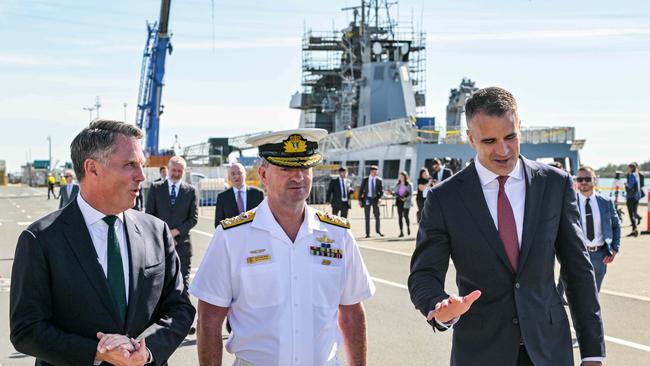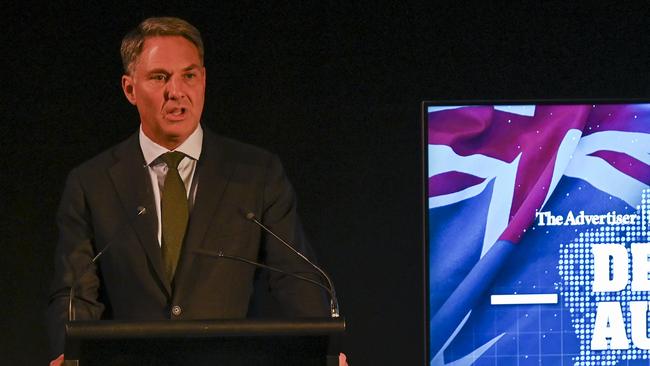Defence Minister Richard Marles says enormous national challenge to find skilled workers for Adelaide-based AUKUS nuclear-powered submarine construction
One of the world’s most advanced manufacturing lines will be built in Adelaide’s northwest – but the Defence Minister admits finding enough skilled workers is a huge national issue.
SA News
Don't miss out on the headlines from SA News. Followed categories will be added to My News.
Finding enough skilled workers and submariners for the $368bn AUKUS nuclear-powered submarine project centred on Adelaide is an “enormous challenge” for the nation, Defence Minister Richard Marles says.
Addressing an Adelaide submarine conference on Tuesday morning, Mr Marles said the Osborne Naval Shipyard would rank among the world’s most complex industrial production lines, requiring massive skills.
Mr Marles said developing these skills, both among a future Osborne workforce and submarine crews, was the “first and foremost challenge” with the $368bn project.
“Building a nuclear-powered submarine will involve the most complex industrial production line that exists in the world today,” Mr Marles told the Submarine Institute of Australia conference.

“And what you will see here in this city, at Osborne … this will be the most hi-tech production line that we will see.
“It will see a massive skills uplift. We will see a massive technological dividend to the broader economy, so this is going to be one of the great Australian industrial ventures we have ever seen.”
But Mr Marles said the most important task was finding skilled workers, saying he could not “understate how enormous this challenge is”.
“First and foremost is to get those skills. The human dimension of acquiring the nuclear-powered submarine capability, I actually think is the biggest challenge, both in terms of the submariners who operate it, but the industrial base to build it,” he said.
Responding to criticism of delays in the AUKUS submarine project, Mr Marles said the government felt acute time pressure, including to start building infrastructure at Osborne.
“If we start losing that timeline early on the whole thing blows out,” he said.
“ … The things we said we’d do at the start we’ve laid out and they are there.”
Mr Marles said he expected to receive a review of the surface fleet by the end of next week and issue a government response in the first part of next year.
This will shape the future of the $45bn future frigate construction project at Osborne.
Mr Marles said he was happy with the progress of the Life-Of-Type-Extension project for the Adelaide-built Collins Class submarine fleet, saying this was on track.
“Extending the life of Collins is a critical part of the pathway to acquiring a nuclear-powered submarine in a manner in which our submarine capability evolves,” he said.

Mr Marles told News Corp’s Defending Australia dinner in Canberra in May that Australia must confront the “inconvenient truths” about China’s positive contributions to the world, while also countering Beijing’s “massive” military expansion threatening regional security.
At the event, Mr Marles said China remained “at the heart of our economic growth,” but raised concerns about the construction of artificial islands in the South China Sea, labelling Beijing a “significant source of anxiety” for Australia’s national security.
Also speaking at the Defending Australia dinner, Opposition Leader Peter Dutton warned against the government relying too heavily on diplomacy to protect the nation against China’s rapid military expansion, insisting “we must put the accelerator down on defence deterrence”.





